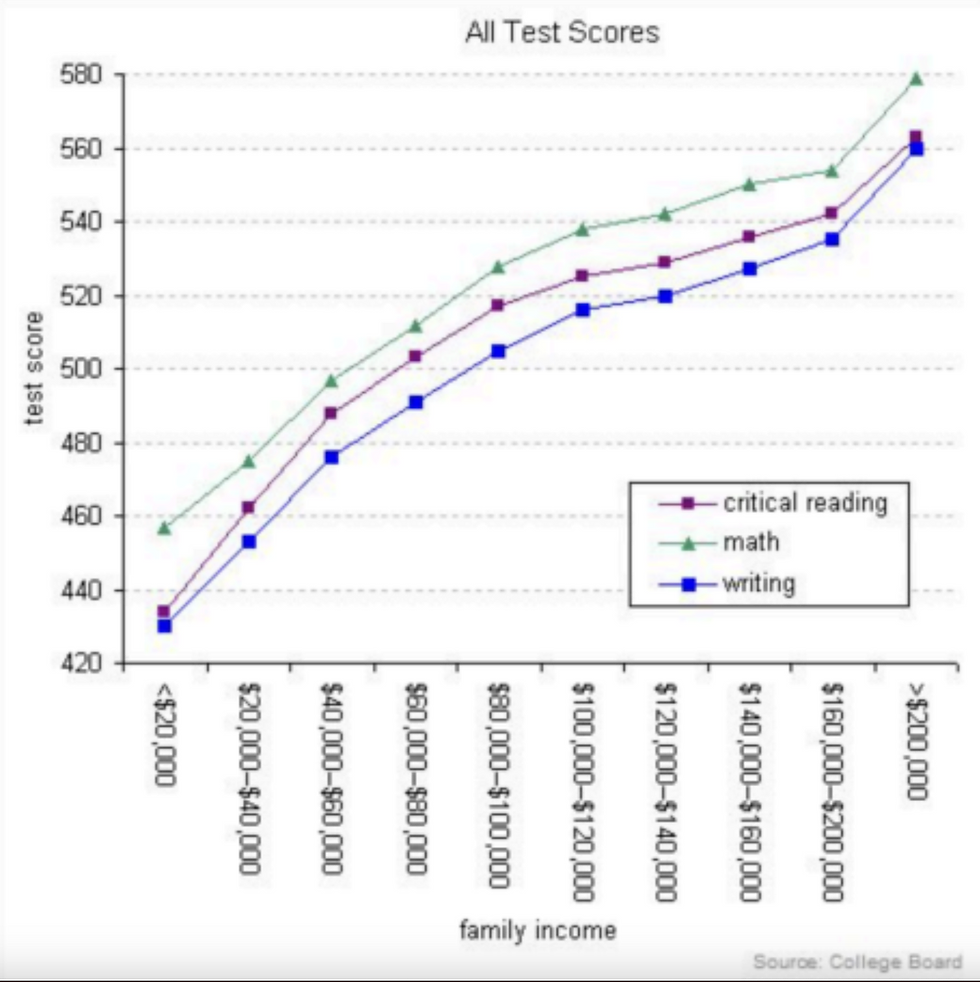Are wealthier kids more likely to score well on the SAT? Studies say yes.
- Derong Zhao

- Jan 18
- 2 min read
Imagine a corrupted system where one’s innate potential is not determined by their talent but by their family’s income. For the millions of students in the realm of academics, this isn't an assumption; this is indeed the strident reality no one wants to face. This fraudulent system, where one’s economic background determines educational success, raises crucial questions regarding the fairness of educational opportunities in the contemporary world.
One distinct area where this inequality is most discernible is during out-of-school hours, where parents with a certain extent of wealth tend to send their kids to academies (Harvard Gazette). Today, one familiar yet nerve-wracking exam stands out to be most affected by family income: the high-stakes SAT exam that many believe to be the determinant of their fate.
A recent Harvard study revealed that “one-third of the children of the very richest families scored a 1300 or higher on the SAT, while less than 5 percent of middle-class students did” (Miller). This disparity articulates how wealthier families can have access to a wider spectrum of resources such as academies, tutoring, and exclusive materials that could potentially increase their scores, while lower-income families - who form 70% of the world - wouldn’t have access to these opportunities. Other organizations such as Collegeboard have shown the same results: a positive correlation between one’s family’s income and the test scores (Page). Long story short, economic inequality restricts academic achievement severely for poorer students.
If one’s fate is predetermined by economic background, wouldn’t this promote a ferocious cycle for poor families to continue passing on the negative impacts to the next generations? As the SAT exam serves as one of the pivotal determining factors for entering a college ranked at the forefront, subsequent life opportunities are most favorably skewed toward upper-income families. So in the spirit of “standardized” exams, let us foster true equality in educational opportunities for all students, regardless of economic status.

Work Cited
“Half of the Global Population Lives on Less than US$6.85 per Person per Day.” World Bank Blogs, 2022,
blogs.worldbank.org/en/developmenttalk/half-global-population-lives-less-us685-pe rson-day. Accessed 5 Nov. 2024.
harvardgazette. “New Study Finds Wide Gap in SAT/ACT Test Scores between Wealthy, Lower-Income Kids.” Harvard Gazette, 22 Nov. 2023,
news.harvard.edu/gazette/story/2023/11/new-study-finds-wide-gap-in-sat-act-test-sc ores- between-wealthy-lower-income-kids/. Accessed 5 Nov. 2024.
Miller, Claire Cain, and Francesca Paris. “New SAT Data Highlights the Deep Inequality at the Heart of American Education.” Nytimes.com, The New York Times, 23 Oct. 2023, www.nytimes.com/interactive/2023/10/23/upshot/sat-inequality.html. Accessed 5 Nov. 2024.
Pages, The Society. “The Correlation between Income and SAT Scores - Sociological Images.” Thesocietypages.org, 2014,
thesocietypages.org/socimages/2012/08/29/the-correlation-between-income-and-sat scores/. Accessed 5 Nov. 2024.

Comments